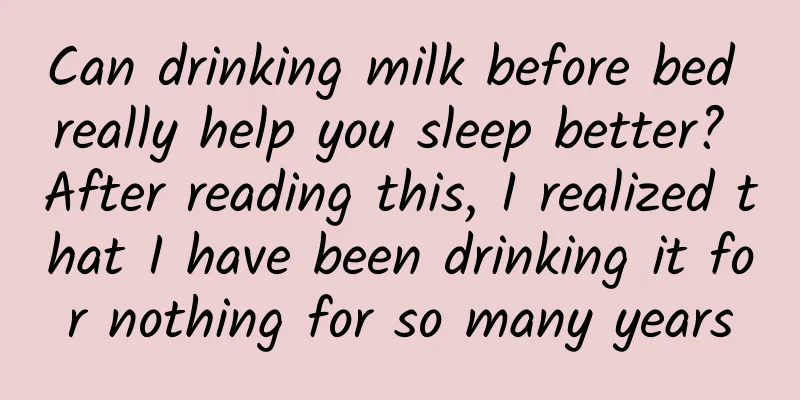Can drinking milk before bed really help you sleep better? After reading this, I realized that I have been drinking it for nothing for so many years

|
Rumor: Drinking milk before bed helps you sleep? Many people believe that drinking milk before bed can soothe the nerves and help sleep, saying that this is because milk contains tryptophan, which can directly or indirectly promote sleep. Therefore, many people must drink milk before bed in order to have a good sleep. Rumor analysis: Not much effect. Milk does contain some tryptophan, but the content is very low. Drinking less will have little effect on helping you sleep, but drinking more will cause you to get up frequently to go to the bathroom at night, affecting your sleep quality. When we suffer from insomnia, we often hear the phrase "drink some milk, milk helps you sleep". In order to improve sleep, many people have developed the habit of drinking milk before going to bed, hoping to sleep more soundly. But can drinking a glass of milk before going to bed every day really help you sleep? In this article, we will reveal the answer and tell you 5 ways that can really help you sleep. Can drinking milk before bed help you sleep? People often say that drinking a glass of milk before bed can help you sleep. The reason for this is that milk contains tryptophan, which is related to sleep. Tryptophan is an essential amino acid that the human body cannot synthesize on its own. It is widely found in foods such as eggs, fruits, vegetables and seeds. It is also a precursor of sleep mediators serotonin (5-hydroxytryptamine) and melatonin. Copyright images in the gallery. Reprinting and using them may lead to copyright disputes. Most people are familiar with melatonin, a hormone produced by the pineal gland in the brain. Its secretion is affected by light, with an increase in secretion at night and a decrease in secretion at dawn. It can regulate the body's biological clock and induce natural sleep. Tryptophan can be used in the body to synthesize 5-hydroxytryptophan, and is further metabolized into melatonin, which participates in sleep regulation. Milk contains tryptophan, which can theoretically promote sleep, but in fact the tryptophan content in milk is very low, only 42mg/100g. Drinking a 200ml glass of milk before bed can only take in 84mg of tryptophan, which is not enough to produce enough 5-hydroxytryptamine and melatonin to make us sleep better. In contrast, the tryptophan intake from eating 2 eggs is nearly twice that of a glass of milk. Why haven't I heard anyone say that eating eggs promotes sleep? Some studies have also mentioned that the amount of melatonin we consume through natural milk (0.5~1L) every day is not enough to reach the clinical minimum effective dose (0.1~0.3mg), and the corresponding clinical trial data has not effectively supported the argument that it promotes sleep, unless it is milk fortified with tryptophan, which may be of some use. In addition, drinking milk before going to bed in order to obtain the little tryptophan in milk, whether it can really help you sleep, will increase the number of times you get up to go to the bathroom at night, and reduce the quality of sleep. In addition, milk contains lactose. If you don’t brush your teeth or rinse your mouth after drinking milk, the lactose will be fermented by oral bacteria to produce acid to corrode your teeth and increase the risk of tooth decay. Therefore, don’t count too much on drinking milk before bed to help you sleep. If you have trouble sleeping, try these things Although drinking milk does not have much effect in helping you sleep, those who have trouble sleeping should not be disappointed. There are many other ways to help you sleep. You can try the following 5 methods! 1. Take melatonin supplements This is the most direct way to supplement melatonin. Currently, melatonin is relatively safe as a dietary supplement. In my country's health food raw material catalog, the recommended dosage of melatonin is 1-3 mg/day. However, we should remind everyone that melatonin can be used as a means of short-term regulation of sleep quality, and do not expect to treat insomnia by taking it. 2. Eat more foods rich in melatonin The food we usually eat contains some melatonin to a greater or lesser extent. Studies have found that eating foods rich in melatonin can increase the level of melatonin in serum and increase serum antioxidant capacity. For example, pistachios, walnuts, tomatoes, strawberries, pineapples, oranges, bananas, barley, porcini, lentils, kidney beans, cranberries, and wolfberries all contain melatonin. Among them, pistachios have the highest content, at 233,000 ng/g. Eating 15 grams, about a handful, can supplement about 3 mg of melatonin. 3. Eat more foods rich in tryptophan In your daily diet, eating more foods rich in tryptophan may help promote sleep, such as cheese, milk, beef, chicken, fish, eggs, pumpkin seeds, beans, oats, peanuts, pistachios, green leafy vegetables, etc. 4. Cover yourself with a heavier blanket A study recruited 120 adults and randomly assigned them to two groups. The control group was covered with a 1.5kg blanket when sleeping, and the experimental group was covered with a 6-8kg weighted blanket when sleeping for 4 weeks. The results showed that within 1 month, 42.2% of the experimental group had significantly improved insomnia. During the 1-year follow-up phase, it was found that 78% of the participants who continued to use this blanket had significantly improved sleep quality and reduced symptoms of depression and anxiety. The study shows that sleeping with a heavier blanket increases melatonin release and promotes better sleep. This may be because the weight of the blanket mimics the feeling of being hugged and massaged, which can help the body relax and get a better sleep. 5. Pay attention to the indoor lighting Dim light can promote the secretion of melatonin. It is best to use curtains with good light-blocking properties, and watch less mobile phones and TV before going to bed. Copyright images in the gallery. Reprinting and using them may lead to copyright disputes. In theory, tryptophan in milk can help promote sleep, but if the intake is small, the effect is minimal. So don't count on drinking milk before bed to help you sleep. For people with poor sleep quality, you can try to eat more foods rich in melatonin and tryptophan, cover yourself with a heavier quilt, dim the indoor light, and don't look at your phone before going to bed. Looking in the mirror of rumors Sometimes, we often have some life experiences and explanations passed down by word of mouth in our lives, but if we think about it carefully, we will find that they may not be tenable. Only through in-depth thinking and verification can we find the real scientific principles behind them. References [1] Xu Wenlong, Liang Yu, Li Lihua, Li Lin, Xu Qiuli, Lan Meijuan, Huang Min, Li Bing. Effects, mechanisms of action and biological evaluation models of natural active ingredients in improving sleep[J]. Chinese Journal of Food Additives, 2024, 35(2): 16-25 [2]Laudisio D, Barrea L, Pugliese G, Aprano S, Castellucci B, Savastano S, Colao A, Muscogiuri G. A practical nutritional guide for the management of sleep disturbances in menopause. Int J Food Sci Nutr. 2021 Jun;72(4):432-446. doi: 10.1080/09637486.2020.1851658. Epub 2020 Nov 30. PMID: 33253056. [3] Yang Jinhui, Wang Menghui, Li Hongliang, Gao Fei, Qian Wentao. Research progress on sleep-inducing functional components in milk[J]. China Dairy Industry, 2020, 48(4): 30-34 [4]Sae-Teaw, Manit et al. “Serum melatonin levels and antioxidant capacities after consumption of pineapple, orange, or banana by healthy male volunteers.” Journal of pineal research vol. 55,1 (2013): 58-64. doi:10.1111/jpi.12025 [5]Ekholm, Bodil et al. “A randomized controlled study of weighted chain blankets for insomnia in psychiatric disorders.” Journal of clinical sleep medicine : JCSM : official publication of the American Academy of Sleep Medicine vol. 16,9 (2020): 1567-1577. doi:10.5664/jcsm.8636 Author | Xue Qingxin, registered dietitian Review | Ruan Guangfeng Director of Science and Technology Department, Kexin Food and Nutrition Information Exchange Center |
<<: What? The down jacket I've worn for so many years might be fake?
>>: The earliest palace, the earliest bronze weapons... Erlitou gave birth to 10 "China's best"
Recommend
Java's concise way
[[143085]] Computer scientists place great value ...
Using data to interpret "Ode to Joy 2" from all angles
As a data analysis enthusiast, the author of this...
FOTILE Double 11 advocates planting trees to retain APEC blue
Last night, when I returned to Beijing from a bus...
Finally able to send large files, but still so stingy? Complain about WeChat's problems
WeChat has been updated, and this time it allows ...
Introduction to Xiaomi Information Stream Advertising Resources
Introduction to information flow advertising reso...
Will Douyin stores be banned for inflating sales? Tips for fake orders in Douyin stores
This article mainly introduces whether Douyin sto...
QQ group new gameplay can realize automatic hanging money making, earning 100+ a day is very easy
QQ group is a relatively unpopular new way to pla...
Is it expensive to produce a Guilin tourist supplies mini program? Guilin Tourism Products Mini Program Production Cost and Process
Mini programs provide convenience for publicity a...
What is fission? Hundreds of fission marketing activities have helped me uncover its mystery!
If you ask what the biggest difference between In...
Young seals put eels in their nostrils, just to keep up with the trend? | Nature Trumpet
In recent years, researchers have discovered a st...
Interpretation of Huawei's Ren Zhengfei's speech: Can enlightened despotism promote innovation?
In 2012, President Ren Zhengfei held a meeting wi...
Known as the "giant panda of the sea", is it the only whale named after China?
Among the 93 species of cetaceans in the world, t...
How long after drinking can you drive? These examples tell you the answer
I often have friends who drive When the police of...









